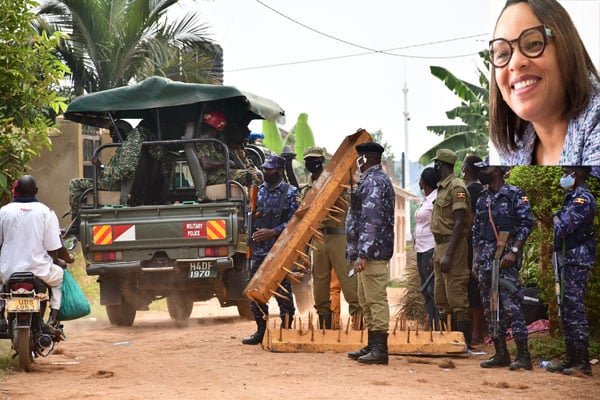After chaotic poll, should Museveni brace for rebellion?

National Resistance Movement (NRM) supporters celebrate the winning of Ugandan President Yoweri Museveni, in Kampala Uganda January 16, 2021.
President Yoweri Museveni’s candidature for a sixth term famously ran on the slogan “Securing your Future”. Yet even after clinching victory with 58.64 per cent of the vote, he may now have to plan how he uses the victory in a society where eight in 10 Ugandans were not born when he took power via guerilla warfare in 1986.
His main challenger, Mr Robert Kyagulanyi, aka Bobi Wine, was only two years old at the time.
Mr Wine received 34.83 per cent of the votes, after running a campaign against constant police harassment and violence. He rejected the results, citing fraud. In an interview with the BBC, he said “all options are now on the table, including, but not limited to, peaceful protest.”
Mr Wine clarified he was not calling for violence, just legal protests against authorities. Analysts think this is the first sign of President Museveni’s cumbersome term ahead.

Robert Kyagulanyi, also known as Bobi Wine, explains how uniformed personnel entered through his home's gate in Magere, Uganda, on January 15, 2021.
Bobi Wine’s National Unity Party (NUP) won 61 constituencies in parliament, meaning it will be the second most popular party in Uganda’s 11th parliament, yet it is the youngest political movement in the country. The Forum for Democratic Change, hitherto the main opposition party, secured 21 seats -- 15 less than in the 10th parliament.
With 310 seats (it had 302 in the last parliament), the ruling National Resistance Movement will take a commanding lead in parliament, including a near-guarantee of influencing the Speaker’s election when the House reopens.
Mr Museveni has survived a strong opposition wave before, often through cracking down on dissent.
“The longer he has stayed in power, the more Museveni has relied on patronage politics, breeding a bloated, ineffective government with one of the largest cabinets on the continent,” argued Mr Murithi Mutiga, project director for the Horn of Africa at the International Crisis Group.

Ugandan President Yoweri Museveni prepares to cast his ballot at the Kaaroh high school polling station in Kiruhura, Uganda, on January 14, 2021.
In this election, more than two dozen ministers and state ministers were voted out, including flamboyant Vice President Edward Ssekandi.
Mr Museveni said before the elections that his country was among the fastest growing economies in Africa. To his credit, his rule has seen one of the most successful fights against HIV, improved literacy, growth of the economy and a more politically stable country. But it also has one of the highest youth unemployment rates. The Ugandan leader admitted last week that the NRM had grown “cobwebs”, and that it was mired in corruption.
“The National Resistance Movement, when we were in the bush, had one line, the mass line, the line of the people where political actors act only in the interest of the people not in the interest of anything else, not in the interest of the elite, not in the interest of foreigners …” he said in a televised address to the country after vote results were announced.
“They acted in the interest of the ordinary people, the farmers, factory workers, the people who live by their sweat, that is what we call the mass line,” he said on Saturday.
Bush stories
The bush story, about the guerilla warfare, has been retold many times to remind Ugandans of who rescued them. But that is lost on the growing younger population that has never seen war.
Mr Alan Tacca, a Ugandan author and socio-political commentator argues that Mr Museveni and his NRM veered off their vision, allowing corruption and self-interest to take centre-stage.
“The future he painted for us was certainly not the future of greed and unbridled corruption that we have seen for so many years,” Mr Tacca recently wrote in the Daily Monitor.
“It was not a future of the naked barbarism we have witnessed since Dr Kizza Besigye challenged his rule 20 years ago, or today’s State terrorism when Robert Kyagulanyi is his main challenger.”

A man reads the "Sunday Vision" newspaper whose front page shows a portrait of re-elected President Yoweri Museveni on January 17, 2021 at a kiosk on a street in Kampala, a day after the election commission said he won a sixth term in office.
Mr Wine claimed he was a true representative of the future, accusing his opponent of living in the past.
President Museveni’s immediate headache is who joins his Cabinet. In the past, he has appointed as many as 45 ministers, rewarding loyalists and luring opponents.
But this term could also be his last, given he will be 81 when the next General Election is held. However, nothing in law prevents him from running again (Uganda removed the presidential age limit in 2017, which had barred Mr Museveni).
A bulletin from the International Crisis Group argued that given Uganda’s presence in a volatile region, it would be in Mr Museveni’s interest to ensure any succession retains the country’s stability.
“Museveni should draw the right lessons from a campaign that has revealed in stark terms his growing unpopularity. His young challenger, or indeed a similar candidate in the future, is likely to continue to draw strong support from the street,” said Mr Mutiga.

A supporter of the National Resistance Movement (NRM) wears a protective face mask printed with the portrait of President Yoweri Museveni as he celebrates the results of the presidential election in Kampala, Uganda, on January 16, 2021.





